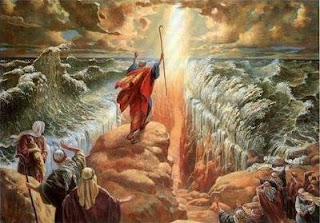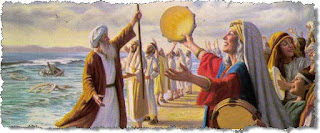THE LIVES OF THE PATRIARCHS #97 | THE LIFE OF MOSES #79
Pastor Christopher Choo
Lesson 3781
THE LIVES OF THE PATRIARCHS #97
THE LIFE OF MOSES #79
Lesson from the Red Sea Crossing
#1
Why is this significant?
The importance of the parting of the Red Sea is that this one event is the final act in God’s delivering His people from slavery in Egypt.
The Exodus from Egypt and the parting of the Red Sea is the single greatest act of salvation in the Old Testament, and it is continually recalled to represent God’s saving power.
The events of the Exodus, including the parting and crossing of the Red Sea, are immortalized in the Psalms as Israel brings to remembrance God’s saving works in their worship (e.g., Psalm 66:6; 78:13; 106:9; 136:13).
God prophesied to Abraham that his descendants would become slaves in a foreign nation for 400 years, but God promised to deliver them: “But I will bring judgment on the nation that they serve, and afterward they shall come out with great possessions” (Genesis 15:14).
The prophecy came to fulfillment when, many years after the death of Joseph, a Pharaoh came to power in Egypt who afflicted the people of Israel and enslaved them (Exodus 1:8–11).
It wasn’t until after the birth of Moses that we read God “heard” the cries of His people and prepared to deliver them (Exodus 2:23–25).
The rest of the story is well known. Moses was commissioned by God to be the deliverer of His people. He went before Pharaoh and requested the people to be let go so they may worship the Lord. Pharaoh refused (“he hardened his heart”) and began to oppress the people of Israel even more.
Then began the cycle of the ten plagues. Moses requested that Pharaoh release his people, Pharaoh refused, God sent a plague, Pharaoh “repented,” and God removed the plague. After the final plague (the death of the firstborn), Pharaoh finally agreed to let the children of Israel go. But then he had another change of heart and chased after them with his army.
That’s when the great scene of deliverance occurred as God parted the Red Sea, allowing the children of Israel to pass through safely, but drowning Pharaoh and his army under the sea.
Now we may be tempted to think that this is a wonderful story of God’s miraculous saving power on display and leave it at that. However, we would be missing the bigger picture in the story of redemption.
The Old Testament prepares the way for the New Testament, and all of God’s promises find their “yes” and “amen” in Christ (2 Corinthians 1:20).
The Exodus from Egypt, though a real, historical event, prefigures the saving work of Christ for His people.
What God did through Moses was to provide physical salvation from physical slavery.
What God does through Christ is provide spiritual salvation from spiritual slavery.
However, our slavery isn’t like that of the Israelites in Egypt. The Israelites were slaves in Egypt, but we are all slaves to sin. As Jesus said to the Pharisees, “Truly, truly, I say to you, everyone who commits sin is a slave to sin. So if the Son sets you free, you will be free indeed” (John 8:34, 36).



